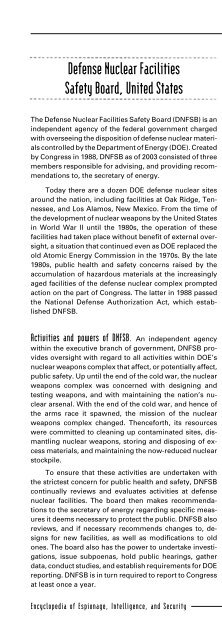ENCYCLOPEDIA OF Espionage, Intelligence, and Security Volume ...
ENCYCLOPEDIA OF Espionage, Intelligence, and Security Volume ...
ENCYCLOPEDIA OF Espionage, Intelligence, and Security Volume ...
You also want an ePaper? Increase the reach of your titles
YUMPU automatically turns print PDFs into web optimized ePapers that Google loves.
Defense <strong>Security</strong> Service, United StatesDefense Nuclear FacilitiesSafety Board, United StatesThe Defense Nuclear Facilities Safety Board (DNFSB) is anindependent agency of the federal government chargedwith overseeing the disposition of defense nuclear materialscontrolled by the Department of Energy (DOE). Createdby Congress in 1988, DNFSB as of 2003 consisted of threemembers responsible for advising, <strong>and</strong> providing recommendationsto, the secretary of energy.Today there are a dozen DOE defense nuclear sitesaround the nation, including facilities at Oak Ridge, Tennessee,<strong>and</strong> Los Alamos, New Mexico. From the time ofthe development of nuclear weapons by the United Statesin World War II until the 1980s, the operation of thesefacilities had taken place without benefit of external oversight,a situation that continued even as DOE replaced theold Atomic Energy Commission in the 1970s. By the late1980s, public health <strong>and</strong> safety concerns raised by theaccumulation of hazardous materials at the increasinglyaged facilities of the defense nuclear complex promptedaction on the part of Congress. The latter in 1988 passedthe National Defense Authorization Act, which establishedDNFSB.Activities <strong>and</strong> powers of DNFSB. An independent agencywithin the executive branch of government, DNFSB providesoversight with regard to all activities within DOE’snuclear weapons complex that affect, or potentially affect,public safety. Up until the end of the cold war, the nuclearweapons complex was concerned with designing <strong>and</strong>testing weapons, <strong>and</strong> with maintaining the nation’s nucleararsenal. With the end of the cold war, <strong>and</strong> hence ofthe arms race it spawned, the mission of the nuclearweapons complex changed. Thenceforth, its resourceswere committed to cleaning up contaminated sites, dismantlingnuclear weapons, storing <strong>and</strong> disposing of excessmaterials, <strong>and</strong> maintaining the now-reduced nuclearstockpile.To ensure that these activities are undertaken withthe strictest concern for public health <strong>and</strong> safety, DNFSBcontinually reviews <strong>and</strong> evaluates activities at defensenuclear facilities. The board then makes recommendationsto the secretary of energy regarding specific measuresit deems necessary to protect the public. DNFSB alsoreviews, <strong>and</strong> if necessary recommends changes to, designsfor new facilities, as well as modifications to oldones. The board also has the power to undertake investigations,issue subpoenas, hold public hearings, gatherdata, conduct studies, <strong>and</strong> establish requirements for DOEreporting. DNFSB is in turn required to report to Congressat least once a year.Encyclopedia of <strong>Espionage</strong>, <strong>Intelligence</strong>, <strong>and</strong> <strong>Security</strong>❚ FURTHER READING:BOOKS:Nuclear Safety: The Defense Nuclear Facilities SafetyBoard’s First Year of Operation: Report to CongressionalRequesters. Washington, D.C.: General AccountingOffice, 1991.Plans, Progress, <strong>and</strong> Experience to Date of the DefenseNuclear Facilities Safety Board: Hearings Before theSubcommittee on Strategic Forces <strong>and</strong> Nuclear Deterrenceof the Committee on Armed Services, UnitedStates Senate, One Hundred First Congress, SecondSession, March 28, 1990. Washington, D.C.: U.S. GovernmentPrinting Office, 1990.ELECTRONIC:Defense Nuclear Facilities Safety Board. (February 22, 2003).SEE ALSODOE (United States Department of Energy)Nuclear Power Plants, <strong>Security</strong>Nuclear ReactorsNuclear Regulatory Commission (NRC), United StatesDefense <strong>Security</strong> Service,United StatesThe Defense <strong>Security</strong> Service (DSS) serves the Departmentof Defense (DOD) in a number of capacities, conductingpersonnel security investigations, providing industrialsecurity products <strong>and</strong> services, <strong>and</strong> offering security trainingto DOD personnel, contractors, <strong>and</strong> employees ofother government agencies. Its most significant undertakingsare the Personnel <strong>Security</strong> Investigations (PSI) Program;the Industrial <strong>Security</strong> Program (ISP); <strong>and</strong> the <strong>Security</strong>Education, Training, <strong>and</strong> Awareness Program.Established as the Defense Investigative Service onJanuary 1, 1972, the service changed to its present namein November 1997 in order to more accurately reflect thebreadth of its mission. Oversight comes from the assistantsecretary of Defense for Comm<strong>and</strong>, Control, Communications,<strong>and</strong> <strong>Intelligence</strong>. As of 2003, DSS employed some2,600 persons throughout the United States, with a muchsmaller contingent in Europe. About half of its personnelroster was comprised of special agents responsible forundertaking approximately half a million PSIs per year.Another 230 employees were involved in the ISP program,working with more than 11,000 contractors involved inresearch, development, <strong>and</strong> other classified projectsoutsourced to specially screened entities in the privatesector.321







![The Big Lie 9-11 and Government Complicity in Mass Murder [PDF]](https://img.yumpu.com/50957077/1/190x245/the-big-lie-9-11-and-government-complicity-in-mass-murder-pdf.jpg?quality=85)








